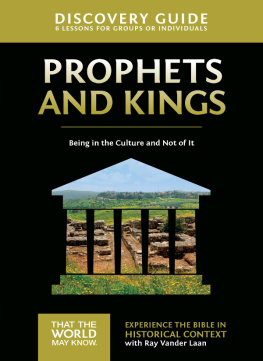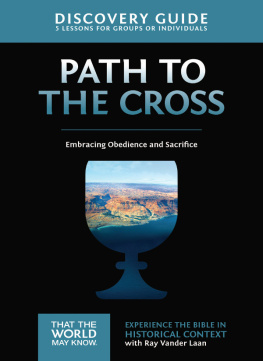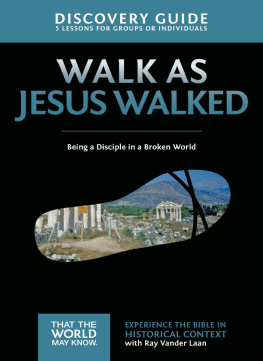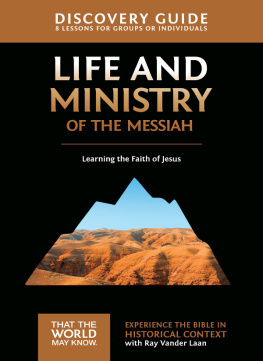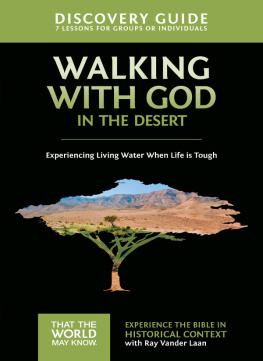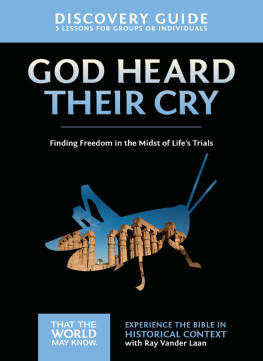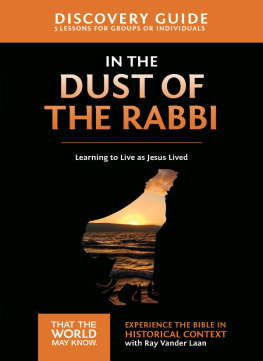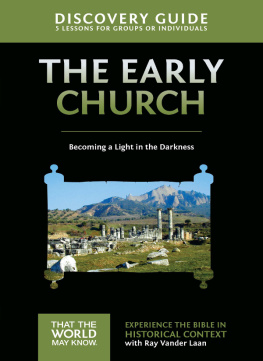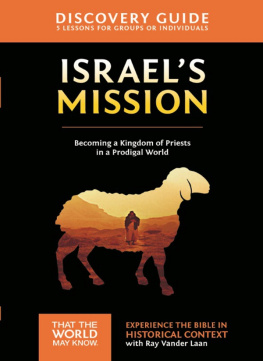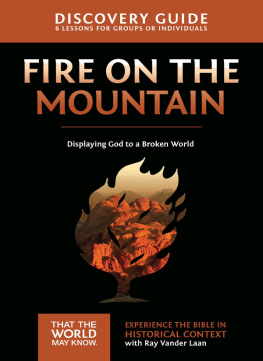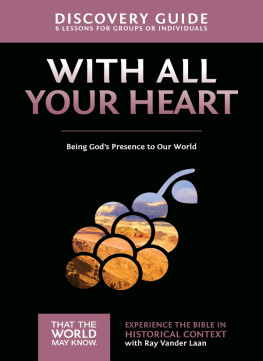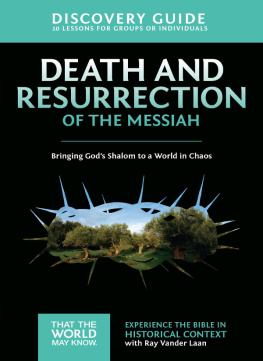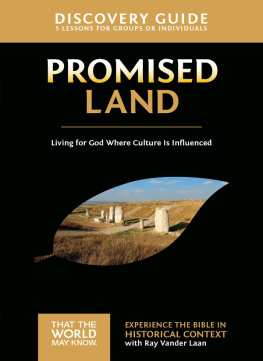That the World May Know with Ray Vander Laan
Volume 1: Promised Land
Volume 2: Prophets and Kings
Volume 3: Life and Ministry of the Messiah
Volume 4: Death and Resurrection of the Messiah
Volume 5: Early Church
Volume 6: In the Dust of the Rabbi
Volume 7: Walk as Jesus Walked
Volume 8: God Heard Their Cry
Volume 9: Fire on the Mountain
Volume 10: With All Your Heart
Volume 11: The Path to the Cross
Volume 12: Walking with God in the Desert
Volume 13: Israels Mission
ZONDERVAN
Prophets and Kings Discovery Guide
Copyright 1999, 2008 by Ray Vander Laan
Requests for information should be addressed to:
Zondervan, 3900 Sparks Dr. SE, Grand Rapids, Michigan 49546
Focus on the Family and the accompanying logo and design are federally registered trademarks of Focus on the Family, 8605 Explorer Drive, Colorado Springs, Colorado 80920.
That the World May Know is a trademark of Focus on the Family.
ePub Edition September 2015: ISBN 978-0-310-87879-7
All maps are courtesy of International Mapping.
All artwork is courtesy of Ray Vander Laan unless otherwise indicated.
All Scripture quotations are taken from The Holy Bible, New International Version, NIV. Copyright 1973, 1978, 1984 by Biblica, Inc. Used by permission. All rights reserved worldwide.
Any Internet addresses (websites, blogs, etc.) and telephone numbers in this book are offered as a resource. They are not intended in any way to be or imply an endorsement by Zondervan, nor does Zondervan vouch for the content of these sites and numbers for the life of this book.
All rights reserved. No part of this publication may be reproduced, stored in a retrieval system, or transmitted in any form or by any means electronic, mechanical, photocopy, recording, or any other except for brief quotations in printed reviews, without the prior permission of the publisher.
Cover design: DoMoreGood
Cover photography: BiblePlaces.com
Interior design: Ben Fetterley, Denise Froehlich
CONTENTS
Ebook Instructions
In this ebook edition, please use your devices note-taking function to record your thoughts wherever you see the bracketed instructions [Your Notes] or [Your Response]. Use your devices highlighting function to record your response whenever you are asked to check-mark, circle, underline, or otherwise indicate your answer(s).
Because God speaks to us through the Scriptures, studying them is a rewarding experience. The inspired human authors of the Bible, as well as those to whom the words were originally given, were primarily Jews living in the ancient Near East. Gods words and actions spoke to them with such power, clarity, and purpose that they wrote them down and carefully preserved them as an authoritative body of literature.
Gods use of human servants in revealing himself resulted in writings that clearly bear the stamp of time and place. The message of the Scriptures is, of course, eternal and unchanging but the circumstances and conditions of the people of the Bible are unique to their times. Consequently, we most clearly understand Gods truth when we know the cultural context within which he spoke and acted and the perception of the people with whom he communicated.
This does not mean that Gods revelation is unclear if we dont know the cultural context. Rather, by learning how to think and approach life as the people of the Bible did, modern Christians will deepen their appreciation and understanding of Gods Word. Unfortunately, many Christians today do not have even a basic knowledge of the world and people of the Bible. This series is designed to help solve that problem. We will be studying the people and events of the Bible in their geographical, historical, and cultural contexts.
Although the DVD segments offer the latest archaeological research, this series is not intended to be a definitive historical, cultural, or geographical study of the lands and times of the Bible. No original scientific discoveries are revealed here. My goal is simply to help us better understand the message of the Bible. Once we know the who, what, and where of a Bible story, we will be able to better understand the why. By deepening our understanding of Gods Word, we can more clearly see Gods revealed mission for our lives and strengthen our relationship with him.
The Assumptions of Biblical Writers
For this study, it is important to realize that people today use the names Israel and Palestine to designate the land God gave to Abraham and that both terms are politically charged. Palestine is used by the Arabs living in the central part of the country, while Israel is used by the Jews to indicate the State of Israel. In this study, however, Israel is used in the biblical sense. This choice does not indicate a political statement regarding the current struggle in the Middle East, but is chosen because it best reflects the biblical designation for the land.
Biblical writers assumed that their readers were familiar with Near Eastern geography, history, and culture. They used a language which, like all languages, is bound by culture and time. For example, the people whom God chose as his instruments the people to whom he revealed himself lived in the Near East, where people typically described their world and themselves in concrete terms. Their language was one of pictures, metaphors, and examples rather than ideas, definitions, and abstractions.
This is why the Bible is filled with concrete images. While we might describe God as omniscient or omnipresent (knowing everything and present everywhere), the people of the Bible would have preferred to describe God by saying, The Lord is my Shepherd, or God is our Father, and we are his children, or God is the Potter, and we are the clay. So to understand the Scriptures, we need to know more than what the words mean, we need to understand them from the perspective of the people who thought and spoke in terms of those images every day of their lives. We need to know what it meant for them to recognize Jesus as the Lamb killed on Passover, and to think of heaven in terms of an oasis in the desert and hell being like a city sewage dump.
The people of the Bible also had an Eastern mind-set rather than a Western mind-set. Eastern thought emphasizes the process of learning as much as or more than the result. Whereas Westerners tend to collect information to find the right answer, Hebrew thought stresses the process of discovery as well as the answer. So as you go through this study, use it as an opportunity to deepen your understanding of who God is and to grow in your relationship with him.
Understanding the World of the Hebrews
More than 3,800 years ago, God spoke to his servant Abraham: Go, walk through the length and breadth of the land, for I am giving it to you (Genesis 13:17). From the outset, Gods choice of a Hebrew nomad to begin his plan of salvation (a plan that is still unfolding today) was linked to the selection of a specific land where his redemptive work would take place. The nature of Gods covenant relationship with his people demanded a place where their faith could be exercised and displayed to all nations so that the world would know of Yahweh, the true and faithful God.
The Promised Land, then, was the arena in which Gods people were to serve him faithfully as the world watched. So if we are to fully understand Gods plan and purpose for his people, we must also understand the nature of the place he selected for them. After all, God showed the same care in preparing a land for his chosen people as he did in preparing a people to live in that land.
Next page
